So You Think You Can Parent
Lisa Leslie Henderson and Allison Ijams Sargent writers
The genesis for this story was simple: roughly twenty-odd years ago, when we held our noses and jumped into the pool of parenthood, we had high hopes and not much else. The old cliché that babies don’t come with instruction manuals never seemed truer. We groped along guided by our intuition, often making amateur mistakes, but slowly, slowly, getting the hang of it. By the time our children were full grown, we actually felt like we had learned a thing or two.
old cliché that babies don’t come with instruction manuals never seemed truer. We groped along guided by our intuition, often making amateur mistakes, but slowly, slowly, getting the hang of it. By the time our children were full grown, we actually felt like we had learned a thing or two.
Our informal parenting networks had always proven reliable during those twenty years. Why not tap into some of that collective wisdom? What if we had asked parents in Wellesley and Weston who were watching college applications fly out the door—in short, parents of older children—a few simple questions? What had they learned? How would they counsel the next generation of young parents?
Figuring that it was better late than never, we sent out our queries and within hours, the answers started pouring in. We were stunned. Here was an outpouring of advice from wise parents who have seen it all. Some of the recommendations were the most down-and-dirty, practical stuff imaginable; others took a minute to wax philosophical on the very nature of child rearing.
A few established viewpoints emerged. We’ve encapsulated those overarching themes in bold but keep reading because the advice below is priceless.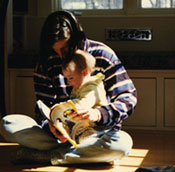
Try to raise good kids who can be happy and successful in the real world; avoid the myth of perfection.
“It is OK, in fact preferable, to let your child struggle a bit more than you are immediately comfortable with. The urge to intervene and mitigate their difficulties is inherent but ultimately creates a child who doesn’t deal well with frustration and looks to unload their struggles/failures on excuses or others. From learning to fall asleep (and stay asleep) on their own, all the way to writing their college essays, we have the tendency to ‘smooth the way.’ This does little to build determination or character.”
“Keep kids busy—particularly with jobs—and some should be as menial as possible so they can relate to the real world beyond the reaches of Weston.”
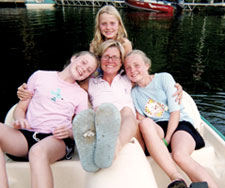 “Kids benefit from doing chores. It makes them feel helpful, competent, and part of something larger than themselves. I wish that I had started having my kids help with chores when they were little. We could have made it a fun activity with games or singing—or not. Trying to inspire a teenager to help out around the house, if they are not in the habit, is difficult at best. Having both spouses model pitching in, without necessarily needing a prompt or complaining, is optimal.”
“Kids benefit from doing chores. It makes them feel helpful, competent, and part of something larger than themselves. I wish that I had started having my kids help with chores when they were little. We could have made it a fun activity with games or singing—or not. Trying to inspire a teenager to help out around the house, if they are not in the habit, is difficult at best. Having both spouses model pitching in, without necessarily needing a prompt or complaining, is optimal.”
“Recognize that your child is not the center of everyone’s universe and that it is your job to help the child grow into someone who can operate successfully in and appreciate the broader world. This means setting boundaries from the get-go that conform to how he or she needs to interact with others in many different environments.
“There is a lot to be said for encouraging decent manners and empathy from a very early age. It also means providing a level of freedom so kids can explore the world and learn its lessons. If you MUST have play dates, leave them to settle their issues unless it’s a case of bloodshed. Keep that concept of judicious intervention as they grow.”
 “Praise your children for how hard they try, not how smart they are. They will try even harder.”
“Praise your children for how hard they try, not how smart they are. They will try even harder.”
“Don’t enable the myth of perfection. It eats away at even the most confident person’s self-esteem and makes it very hard to be happy.”
Introduce your children to the larger world. It is not all about getting into college. And it’s not all about them.
“I would have exposed my children to much more of the world, early on. There is so much more to life than soccer, baseball, and Facebook. I would have taken them to more art galleries and traveled with them more. You can’t appreciate that which you do not know.”
“Service has opened our entire family’s eyes and drawn our family closer.”
“With all the technology vying for our children’s attention, be sure to foster wonder in the natural world around us. Take them outside to see a beautiful full moon. Point out a gorgeous sunset. Listen for the call of a hawk. Teach them the names of the different types of birds that visit your backyard.”
“When it is so exhausting to keep making sure your young children are saying thank you, picking up toys, writing thank-yous, etc., keep in mind that you are helping to mold/shape 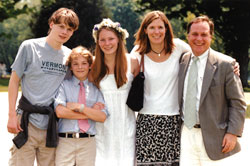 the young adults your children will become.”
the young adults your children will become.”
“Build an active faith component to your family life. Go to church or to synagogue. Help kids to know that there are powers greater than them, be they a community or God. Sometimes that is all that gets you through.”
“Nourish your family. Establish family traditions. They can be drawn from your own past or modified to whatever suits your lifestyle. Traditions promote a family’s roots and a family’s cultural history. They help to develop self-esteem and a sense of home and belonging. Our children and nieces are all young adults, and they will call from wherever they are to make sure we’re having our traditional Christmas Eve.”
Communicate. Communicate. Communicate.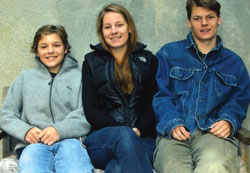
“Making kids feel it is okay to speak with you about any issue is just so important. When they misbehave, the conversation should focus on “this is unacceptable behavior”—not that they are bad.”
There is always room to be a better listener and be really present when your child is talking to you.
Accept and enjoy your child for who they are, not necessarily who we would like them to be.
“The parent is a mirror to the child; how they come to see themselves begins with what they see reflected back at them from you.”
“Think of unhelpful personality traits or temperament as part of the whole package, inextricably linked and maybe even fundamentally necessary to all the wonderful things about that child. Not that you can’t still try to ameliorate the negatives; you should. But keep it in the context of all the good stuff.”
 “Be sure to instill great confidence in who the children are. I cannot stress that enough. When a child feels good about themselves they can deal with issues that come forth.”
“Be sure to instill great confidence in who the children are. I cannot stress that enough. When a child feels good about themselves they can deal with issues that come forth.”
“Never rush growth or measure your child’s development next to any other child. You’ll minimize the joy you take in your own child’s firsts and daily growth. This is an overt parental decision you make, or those doubts and comparisons come to your mind, then your lips, and your child internalizes them for life.”
Own your own issues; don’t make them your child’s.
“I wish that I had come to terms with my addiction earlier on, realizing that by learning real coping skills, and the ability to face life on life’s terms, I would have been a much more effective mother.”
“After quitting my job to become a full-time, stay-at-home mom, I felt I had to do a lot for the kids in order to justify all my time at home. Now I feel my kids aren’t as independent as I’d like.”
“Acknowledge your own mistakes.”
“ I think it is so important for both parents to have their own interests/careers/hobbies, etc., otherwise their children’s lives will completely consume them in a way that would be unhealthy for both parent and child.”
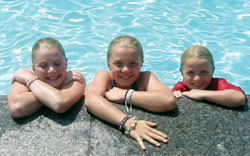 Don’t be afraid to say “no.”
Don’t be afraid to say “no.”
“If you are a firm and consistent parent when the children are young, they will expect that of you when they are older, and there will not be as many battles.”
“Consistent discipline when your children are young, including instilling respect for adults, will help to create teenagers that you—and those around you—can live with.”
“I wish that I had devised a better way to get the kids to do what they had to do without nagging sooner. It took years to figure out that I had to have a ‘when…. then’ strategy and stick to it. ‘When you do X, you will be able to do/get Y.’ One statement, one time, no compromise. It works amazingly well until the teenage years where, like everything else, its efficacy is spotty.”
“Respect your child’s limits.”
“Be painfully consistent with toddlers, but validate your evolving adults by showing flexibility of mind with teens. This doesn’t mean compromising your values, it means knowing when to compromise.”
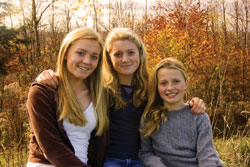 “Never let them see you sweat.” Stay calm in all situations when dealing with children. Children are like deer and can sense the slightest shift in your mood: if you are angry they will reflect your anger, if you are anxious they will become anxious too. It is hard to react in a thoughtful way if you are angry, frustrated, anxious, or sad. If you stay calm the most logical solutions to most parenting situations will come to you naturally.”
“Never let them see you sweat.” Stay calm in all situations when dealing with children. Children are like deer and can sense the slightest shift in your mood: if you are angry they will reflect your anger, if you are anxious they will become anxious too. It is hard to react in a thoughtful way if you are angry, frustrated, anxious, or sad. If you stay calm the most logical solutions to most parenting situations will come to you naturally.”
“In order to be a good, effective parent, one cannot also try to be her child’s buddy. There are many times that we, as parents, need to set boundaries, and those boundaries are going to anger our children. As a teacher, I watch parents of my students repeatedly make the mistake of being afraid to say ‘No.’ The children of these parents are the ones who get themselves into trouble.”
“Allow them to make mistakes and ensure that they live with the consequences, no matter how painful it is for ALL of you.”
Take it easy and enjoy the process
“Children do grow up; sometimes because of us, and sometimes in spite of us. One ‘bad’ year at school or ‘bad’ act does not a dropout or a criminal make. The most trying times often precede great personal growth—for both children and parents.”
“To feel successful in parenting, you have to really be flexible. You never know if you are going to have a sleepless night, a vomiting baby in your lap, or hit a developmental milestone. When your child is frustrating you, you need to be able to take a deep breathe and let go of the situation.”
“Nothing is in your control. You need to let go of all that you had imagined you might do or be, and all that you had imagined your kids might experience; you can set a structure and some guidelines—and certainly expectations—and just go with the flow.”
“Drive carpool when possible. Kids think you are deaf and will often have uninhibited conversations.”
“Kids are really resilient and will survive your mistakes.”
“I wished I worried less and enjoyed the journey more, and wasn’t so concerned about the outcome.”
“It pretty much turns out okay in the end. It never really ends, by the way.”
“I wish I knew how rewarding it is to be a parent—I might have had more kids.”
Let’s Keep the Conversation Going
Many thanks to the mothers and fathers in Wellesley and Weston who responded to our e-mail and our inquiry on the WellesleyWeston Magazine blog that provided the fodder for this article. It would take a small book to share all of their thoughts and indeed, we wish that we could share them all. Let’s keep the dialogue going. Sit down with a cup of tea, or just grab a moment between meetings or drop-offs, and post your thoughts on the WellesleyWeston Magazine blog (wwmblog.com).


recent comments